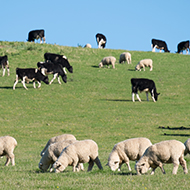Chief vet welcomes cattle and sheep health and welfare reports

Both reports highlight the role of livestock farmers in supporting One Health efforts to reduce the development of antimicrobial resistance.
The UK's chief veterinary officer has welcomed two reports from the UK Cattle and Sheep Health and Welfare Groups (CHAWG and SHAWG) highlighting areas of focus to drive forward improvements in farm health and welfare.
Representing 10 years of government and industry collaboration, the reports cover industry structure and priorities, challenges and opportunities, disease surveillance, health performance, and responsible medicine use.
Chief veterinary officer Christine Middlemiss said: “We congratulate the groups and all of their participants on providing the bridge between individual farm management and the health and welfare narrative that is so crucial to the future of the industry.
“Collating key data and understanding drivers for behavioural change are vital. The value of the continued work in driving health and welfare improvements, along with environment, performance and cost benefits, has been recognised across the sector."
She continued: “We now need to work in partnership across government, industry, science and academia, using a sound evidence base to agree disease control and eradication strategies moving forward.”
The CHAWG report provides a broad summary of facts and figures relating to the UK cattle industry. It reveals that industry-led programmes to eradicate bovine viral diarrhoea (BVD) and Johne’s Disease continue to make great progress as a result of new marketing campaigns and initiatives.
The report also shows that substantial progress has been made on reducing the numbers of dairy bull calves euthanised on farm. A cross-industry coalition has outlined a vision for the dairy industry to rear all calves with care and eliminate euthanasia of calves by 2023.
The SHAWG report examines progress over six key objectives, including aims to reduce the impact of disease through better use of surveillance and prioritising nutrition and welfare.
It shows there has been a marked reduction in national levels of lameness, with the sector heading towards meeting the Animal Welfare Council target of fewer than two per cent of sheep lame by 2021.
Both reports highlight the role of livestock farmers in supporting One Health efforts to reduce the development of antimicrobial resistance.



 The RCVS has announced a new version of its 1CPD mobile app, with enhanced features for veterinary surgeons and veterinary nurses to record their continuing professional development.
The RCVS has announced a new version of its 1CPD mobile app, with enhanced features for veterinary surgeons and veterinary nurses to record their continuing professional development.